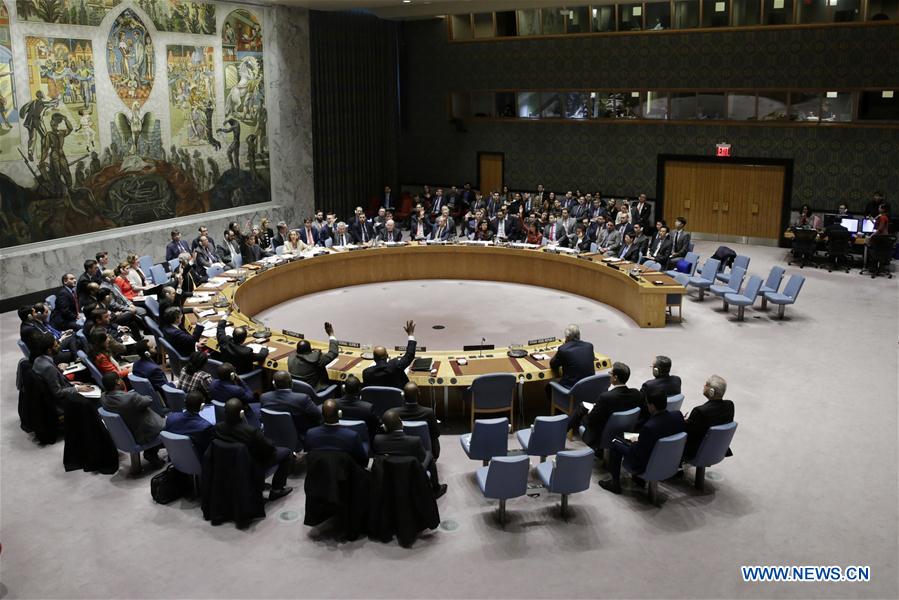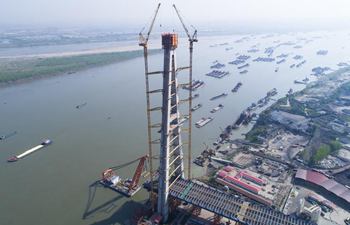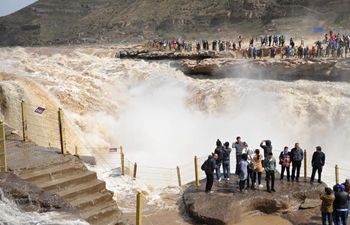Photo taken on April 10, 2018 shows the United Nations Security Council voting on a U.S.-draft resolution on probe of chemical weapons use in Syria at the UN headquarters in New York. Russia vetoed a U.S.-drafted Security Council resolution on probe of chemical weapons use in Syria on Tuesday. (Xinhua/Li Muzi)
DAMASCUS, April 10 (Xinhua) -- The U.S.-Russia tension runs high over the alleged chemical weapons attack in Syria, while the U.S. seems banging the drums of war in Syria using the same old pretext of chemical weapons.
Intense political clashes were witnessed in the UN Security Council on Tuesday between Russia and the U.S. over the recent allegations of chemical weapons used by the Syrian government forces in the battles against the rebels in Douma district of Damascus.
Activists claimed the Syrian army used chlorine gas in the attack, a claim completely denied by the Syrian government, which accused the rebels of making up pretexts to attract foreign military intervention.
U.S. officials have also spoken of military action against Syria, but the eyes were fixed on Tuesday evening on the session of the UN Security Council, where both major powers fought diplomatically.
The clash between both powers was reflected in the two draft resolutions on the form of investigating the alleged incident.
Both powers vetoed each other's draft resolutions, with the U.S. ambassador to the United Nations Nikki Haley saying that the main difference between the U.S.-drafted text and the Russian one is that Russia wanted to choose the investigators and assess the outcome while the U.S. text allows for an independent investigation.
Russian ambassador to the United Nations Vassily Nebenzia said the U.S. draft prejudges the outcome of an investigation, as the U.S. has already made its accusation without investigation.
The U.S. has for long been accusing the Syrian government forces of using toxic gas in an attack on Eastern Ghouta countryside of Damascus, basing its accusations on claims by the rebels.
But last Saturday's alleged incident seemed like the pretext under which the U.S. could justify striking Syria after the Syrian army emerged victorious and after it found the Russians and the Iranians in a stronger position in Syria than itself.
Analysts in Syria said the U.S. threats of military action on Syria is "serious" and exceeds 90 percent.
Hmaidi Abdullah, a Syrian political analyst, told Xinhua the U.S. threats of military action on Syria were "serious," saying they reflect the U.S. desire to undermine the Russian-Iranian-Syrian alliance, which is gaining the upper hand in Syria.
He said the U.S. is under pressure from Israel and Saudi Arabia to act against the growing influence of Iran in Syria.
Abdullah said the U.S. has the desire to strike Syria but the decision has not yet been made.
Mahmoud Meri, another political analyst, said the U.S. and its Western allies are preparing to launch strikes on Syria, which could fuel a regional or even international war because Syrian and its allies promised to respond to the fire sources.
Maher Ihsan, a journalist, and political expert told Xinhua that the U.S. is not okay with the Syrian and Russian sides winning in Syria, adding that the recent victory of the Syrian army in the Eastern Ghouta countryside of Damascus has raised the ire of the U.S. administration.
"The U.S. wants to say I am here and I call the shots," he said.
The analysts speculated that the possible U.S. strikes could be limited, such as in the last year when the U.S. fired Tomahawk missiles on a Syrian base in central Syria over similar allegations of chemical weapons' use.
Earlier in the day, Russia's envoy to the European Union, Vladimir Chizhov, said his country has warned the U.S. against striking Syria.
Speaking to Euronews, Chizhov said "Russia has warned U.S. representatives, publicly as well as through proper channels, over the grave consequences that could arise if these strikes happen and whether deliberately or otherwise Russian citizens are hurt."
On Monday, Trump promised a decision on a possible military response within 24 to 48 hours.
Related:
Security Council fails to adopt Russian-drafted resolution on OPCW probe of Syria chemical attack
Russia vetoes U.S.-drafted Security Council resolution on probe of chemical weapons use in Syria


















